Enduring Outrage: Editorial Cartoons by Herblock
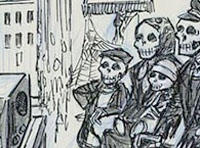
Political cartoonist Herbert Block's career spanned more than 70 years, over the course of which he produced more than 14,000 cartoons and won three Pulitzer Prizes in 1942, 1954, and 1979. He spent the majority of his career at the Washington Post, where he critiqued Democrats and Republicans alike, and covered topics from McCarthyism (a term he coined in a cartoon published in 1950) and the Nixon Administration to Chernobyl, the Vietnam War, and the Yugoslav Wars in the mid-1990s. This website presents 32 of his cartoons, relating to seven prominent themes in his work: the environment, ethics, extremism, voting, the Middle East, privacy and security, and war. Each cartoon is enlargeable and downloadable, and accompanied by a brief description of the context surrounding its creation and publication, as well as several sketches drawn by Herblock made in preparation for drawing the cartoon. Useful for those interested in U.S. political history and foreign relations, as well as the history of editorial cartoons.
U.S. Electoral College
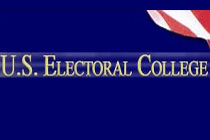
Basic statistical data and explanatory material on the workings of the Electoral College, provided by the Federal office that coordinates its operations. Data includes electoral and popular vote totals for presidential elections since 1789; listings by state of electoral college members for 1992-2000; facsimiles of certificates of ascertainment and certificates of votes for the 2000 election; and a digest of current state laws and requirements. Also offers a 2,700-word procedural guide; relevant federal law provisions; a 1,600-word description of state responsibilities; and 10 links to additional National Archives sites of relevance. A quick and easy way to locate vote tallies and legal information regarding the institution of the Electoral College.
Remembering Herblock
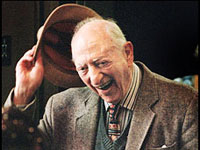
Presents an exhibit of 36 political cartoons and five essays by Herblock (Herbert Block), the acclaimed Washington Post political cartoonist who died in October 2001 after a career spanning seven decades. This tribute includes cartoons and the essays originally put together in 1995 for the exhibit "Five Decades of Herblock," as well as cartoons from 1998 to 2001, 12 photographs, three essays of appreciation, and the editorial that appeared in the newspaper the day after he died. As if to illustrate Herblock's observation that "Political cartoons, unlike sundials, do not show the brightest hours," the exhibit addresses such "dark" American topics as the "fear and smear" era of HUAC and McCarthyism (a term Herblock himself coined), Jim Crow in the 1950s and 1960s, the Vietnam War, Watergate and other Nixon-era scandals, Reagonomics, the 1994 Republican "Revolution," the Clinton impeachment, the Columbine shootings, and the Supreme Court decision in Bush v. Gore. Although the site is marred by annoying pop-up ads, this remains a valuable site for those studying popular culture and the history of political cartoons.
Presidential Elections and the Electoral College
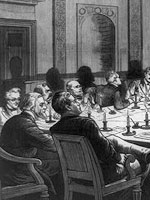
This website is part of the Library of Congress exhibit, "A Century of Lawmaking for a New Nation: United States Congressional Documents and Debates 17741873." It provides links to the Library's extensive holdings on American presidential elections and the electoral college.
Ten links to resources from the Library's feature "Today in History" provide 250-word discussions of noted events and include links to 2030 online documents for each feature. These documents include presidential campaign and inauguration speeches, government documents such as the certification in Congress of the first electoral college's balloting, controversies regarding the electoral college, and journals from late-18th and early-19th century political figures like William McLay.
Keyword searches make all of the Library's digitized documents on any given subject available through this site as well. This site is ideal for researching America's first century of political history.
Presidential Elections
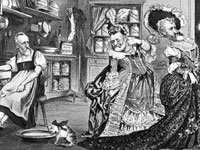
This site documents the American presidential elections from 1860 to 1912. For each election, the site provides a detailed, 3,000-word overview that places the election within political and cultural context, and discusses the major issues relevant to the election. The producers have also included an essay on the practice of campaigning (4,500 words): how it has changed over the centuries, how those changes have resulted in an increased democratization of the political process, and how the press has shaped the process. In addition, the site exhibits about 90 political cartoons (from Harpweek, Vanity Fair, and Puck, among others) from elections, and provides biographies for each of the candidates. Also included for each election are "Events" sections that discuss major events before, during, and after each election period.
Teachers should be aware that some materials contain racial epithets. Notwithstanding the relatively few primary sources, this site is an excellent introduction to the 1860 to 1912 elections.
Getting the Message Out! National Political Campaign Materials, 1840-1860
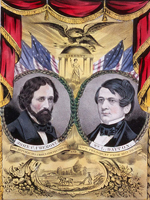
After property qualifications for voting were eliminated in the 1830s, the American electorate expanded from 1.5 million to 2.4 million. As abolition, the extension of slavery, the Mexican War, and the Dred Scott decision dominated the national debate, songs, parades, and barbecues became increasingly important campaign tools to reach out to new voters. This type of political material culture is highlighted through this website, presenting 1,200 documents, more than 650 images, 100 songs, and interactive country-wide Presidential election maps for all six Presidential elections between 1840 and 1860. Detailed contextual information is available on a wide range of subjects, such as political campaigns, political parties, and major national events. Five short videos by well-known scholars address political culture, the second party system, politics as popular entertainment, and women's roles in antebellum politics. The detailed lesson plan in the "Teacher's Podium" challenges students to assess changing campaign strategies through song lyrics.